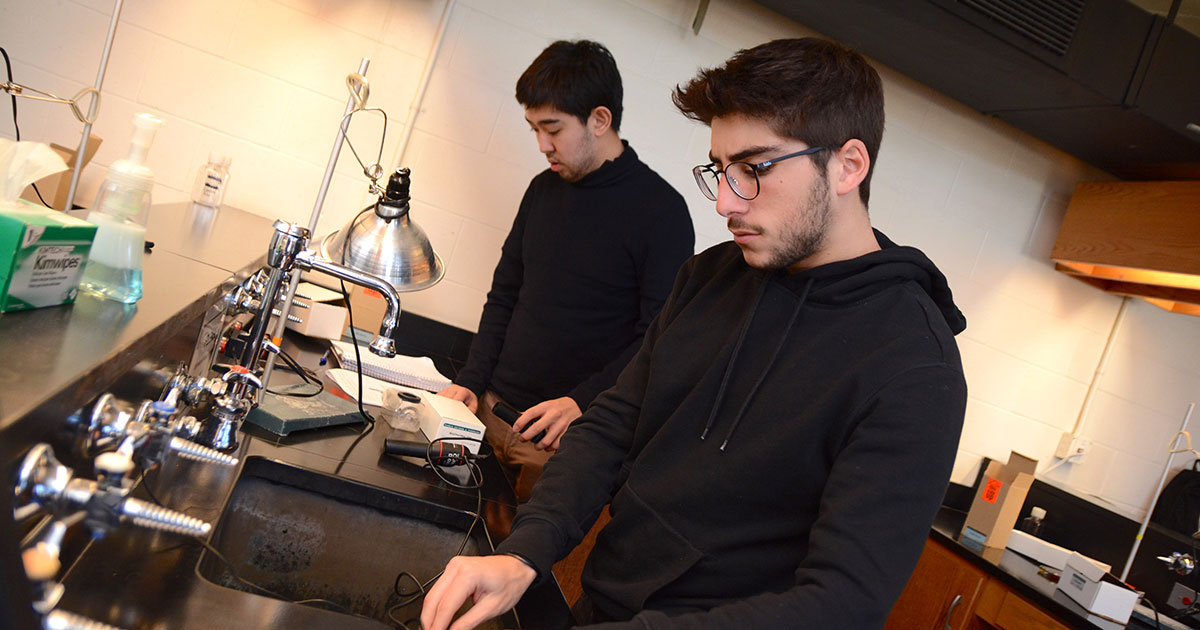Studying Science at a Business School

More than 70% of the world is covered by ocean, making it one of our most important resources.
Yet, humans continue to degrade this life-crucial source, and allow it to become a dumping ground for waste and pollution.
“The World Doesn’t Need Saving. People Do.” – Joanna Carey
According to assistant professor of Earth and environmental science Joanna Carey, many students enter Babson having heard about the need to save the Earth, but this is not the most effective way to frame issues around environmental degradation. “The Earth has gone through numerous disruptions over its 4.5 billion-year history and ultimately, it will be fine. But, humanity’s future? That is less certain as we continue to degrade the planet.”
It’s this very reason that Carey brought her expertise and research to the No. 1 school for entrepreneurial leaders.
In Carey’s most recent course, Oceanography, students learned of the most detrimental human environmental impacts, including climate change, marine pollution, and overfishing. Her hope: that the lessons in the course make students more self-aware and ethical decision makers, in life and in business. This spring, after all Babson courses moved online, Carey pivoted her lessons to demonstrate the relevancy of her class through the lens of the current pandemic.
“We talked a lot about the connections between COVID-19 and climate change, such as the need to flatten the curve, the reliance on science to make good decisions, and the fact that both crises highlight inequities in current social economic systems,” she said.
“We have a choice as a society as to what our future holds.”
Joanna Carey, Assistant Professor of Earth and Environmental Science
The severity and pervasiveness of these concurrent crises, COVID-19 and climate change, can easily overwhelm students, leaving them defeated from taking action to combat these problems. To prevent crisis fatigue, Carey stresses the fact that solutions exist to these problems—and, “we have a choice as a society as to what our future holds.”
Hope is a key factor in empowering students to play a role in creating a better future for society. In their final class discussion, they looked at the opportunities that both crises present. Students were then tasked with sharing their vision for a better future. The following are just a few examples.
Reflection and Change
“The most important point that I took away from this class was that we have the solutions to solve the problems, we just need to band together to make it happen.” – Vicki Maler ’22
“Without understanding the problem, our society will be less likely to take action. … The knowledge that I’ve learned will change my daily actions. Imagine if society was being taught these ideas on a much larger scale. The impact would be huge.” – Jack Kannam ’22
“ ‘I am just one person, how much of a difference do I really make?’ This mentality is why climate change is still such a problem. … It is our duty as residents of this planet … to think about who comes next and not about us. It is our duty to leave the planet as we found it, if not better.” – Lorenzo Gavazzi ’22
“Business is the source (of environmental degradation) but also the solution. When considering my future job and companies I will work for, I will consider the development of sustainability as one important criterion.” – Meixi Ren ’22
“Seeing everyone come together today to fight COVID-19 gives me hope that all of us can come together to save our planet as well.”
Nishvi Jain '23
Bringing Business Students to the Field
Coming together is exactly what Carey, and peers from Olin College of Engineering, plan to do in their classes and research.
Future students of Carey’s can look forward to being part of a brand new effort to develop technology solutions to crucial, local environmental needs, thanks to the Babson Olin Wellesley Three College Collaboration and a new, well-deserved grant award from MIT Sea Grant.
Co-led with two Olin College faculty members, Jeff Dusek and Alessandra Ferzoco, this effort will bring their business and engineering students together to create real impact in the world of offshore aquaculture.
“We are developing a new monitoring sensor to use in offshore aquaculture facilities that will allow farmers to understand and regulate their ecological impact,” said Carey. “There is a large opportunity for growth in the New England offshore aquaculture industry, which has not yet flourished like in other parts of the world. A better understanding of the ecological impacts of aquaculture activities is key to fueling industry growth in the U.S. Our new monitoring devices will directly help fill this knowledge void.”
Carey, who says she loves teaching future business leaders about the environment, wants her students to see the opportunity that comes with better understanding of the world around them.
“It’s really important for them to be educated in the life-supporting processes on Earth,” she shared. “When I talk about aquaculture, for example, I highlight for them that this is one of the fastest-growing food sectors in the world. We talk about why that is, environmental impacts, good or bad, and potential for them as business leaders to use this knowledge to create social and economic value.”
Posted in Entrepreneurial Leadership



